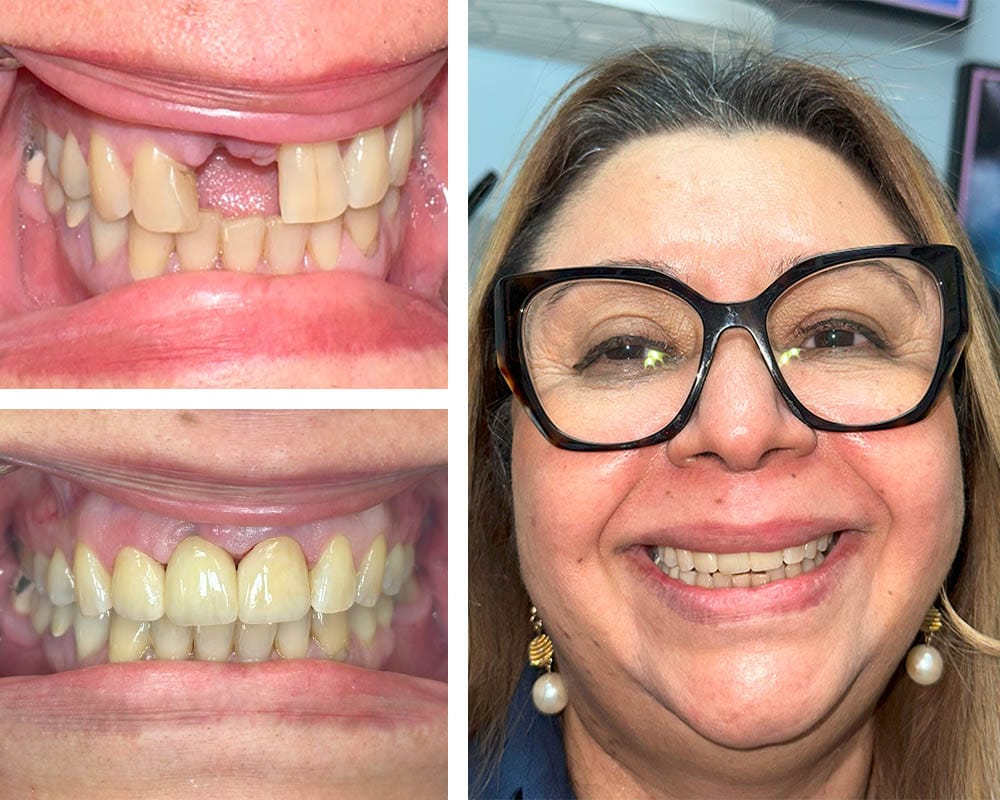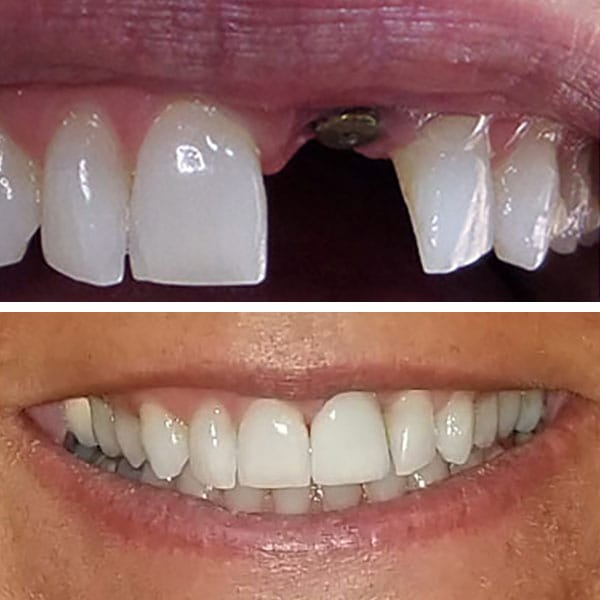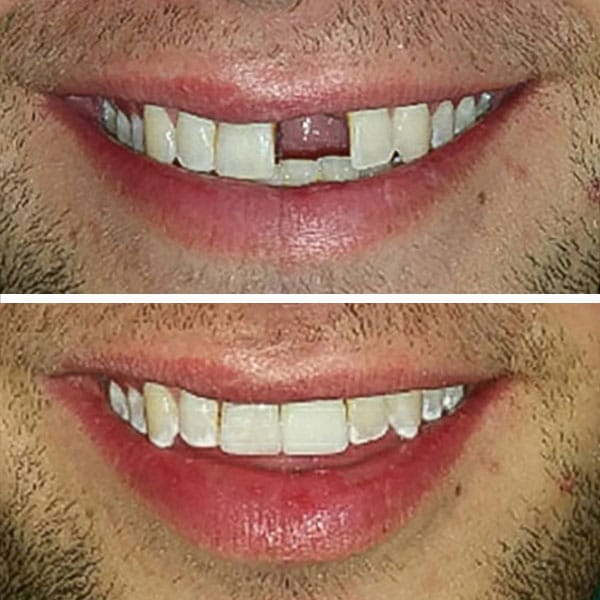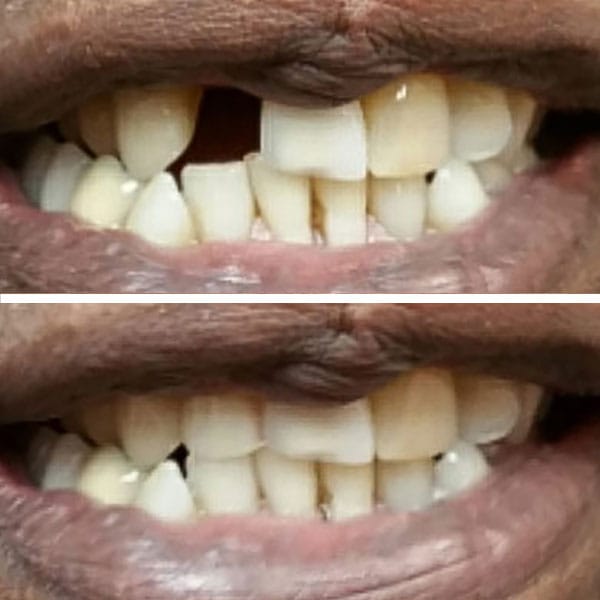What Is a Dental Implant?
An implant is a small post or screw placed into your jawbone during a surgical procedure. There are three main components to tooth implant, which are described below.
-
Implant Screw
The implant screw or post replicates a tooth root. It is inserted precisely into your jawbone during oral surgery.
-
Implant Abutment
An implant abutment is attached to the implant screw, so it protrudes above your gums. Its purpose is to support your new implant restoration. Numerous implant abutments are available, depending on the type of restoration needed.
-
Implant Restoration
Your implant restoration artificially replaces the missing tooth. Dental implant restorations can be implant crowns, bridges, or dentures.
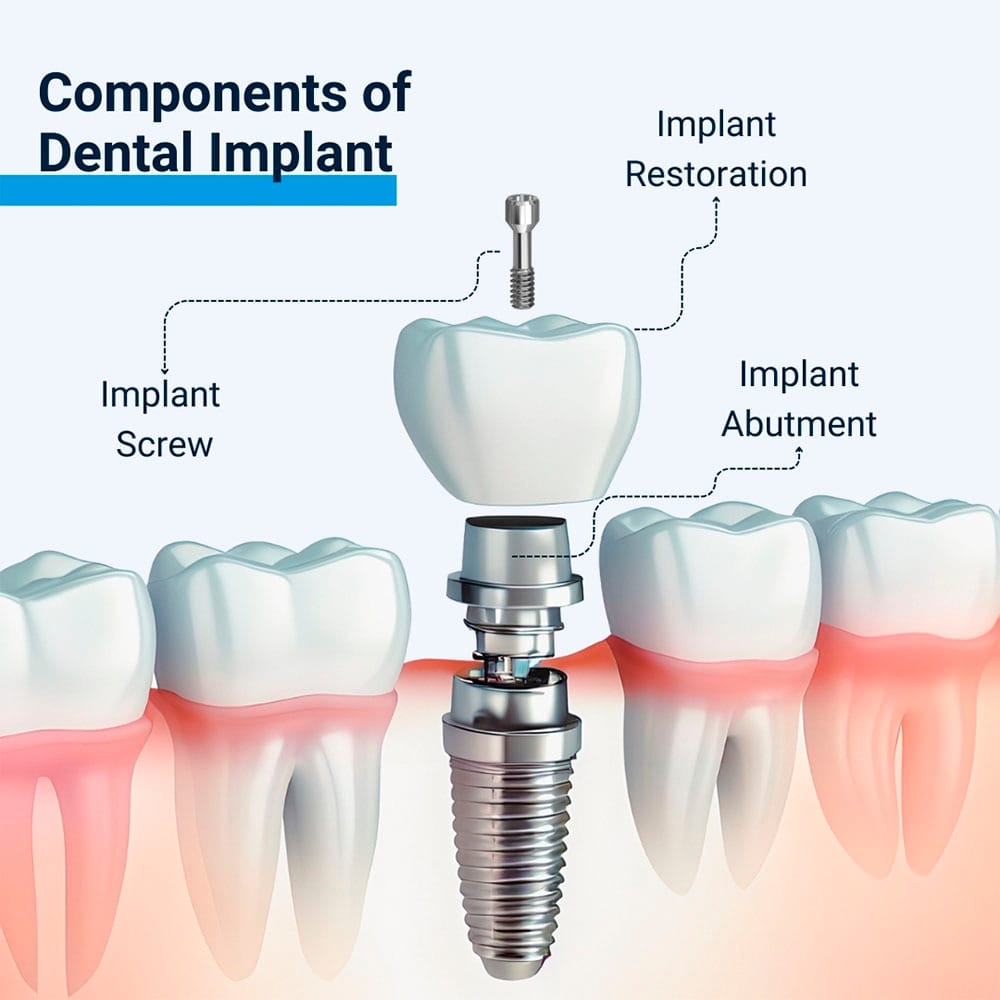
At Clock Tower Dental, we offer affordable, high-quality tooth implants along with a personalized approach for every patient. If you are looking for an affordable dentist in Franklin Square who provides professional implant services, our skilled team is ready to help you restore your smile. Contact us today to learn more about your dental implant options and to schedule a consultation.
Tooth loss remains a significant oral health issue in the United States. According to the CDC and recent national surveys, approximately 178 million Americans are missing at least one tooth, and about 2.2% of adults aged 20–64 are completely edentulous. Among seniors, the numbers are even higher—11.4% of adults aged 65–74 and 19.7% of those 75 and older have lost all their teeth. Despite advances in dental care, tooth loss continues to affect millions, especially in older age groups.
Understanding the Different Implant Services Available
Your dental implant treatment will be customized to fit your needs, depending on whether you need one tooth or every tooth replaced. A brief description of the implant treatments available is below.
Single Dental Implants
When only a single tooth is missing, we can easily replace it with just one implant that will be restored with an implant crown. The implant crown is fixed permanently over the abutment and is non-removable.
Dental Implant Bridge
Dental bridges are an excellent way to replace teeth that were originally adjacent to each other. An implant bridge uses two or more dental implants to secure a non-removable bridge of teeth.
Dental Implant Denture
Implant-retained dentures are removable but are far more secure than an ordinary traditional denture that rests on your gums. Instead, the denture clips firmly onto tooth implants, but you can snap it out for easy cleaning and maintenance.
All-on Four
All-on-Four is an advanced technique for restoring a complete arch of teeth. Usually, this treatment would require multiple dental implants, but All-on-Four requires just four dental implants for support. Depending on the restoration selected, treatment can secure a complete arch of non-removable or removable teeth.
Mini Dental Implants
A mini dental implant is different from a regular implant. It is suitable for restoring teeth where space is tight, such as small lower incisors. We may also recommend mini dental implants to secure dentures.
See Before & After Results
See more photos of dental implants before and after.
Materials Behind Modern Tooth Solutions
Most teeth implant screws and abutments are made from medical-grade titanium, an extremely biocompatible material. However, some are made from zirconia, a strong, durable ceramic material that is also highly biocompatible.
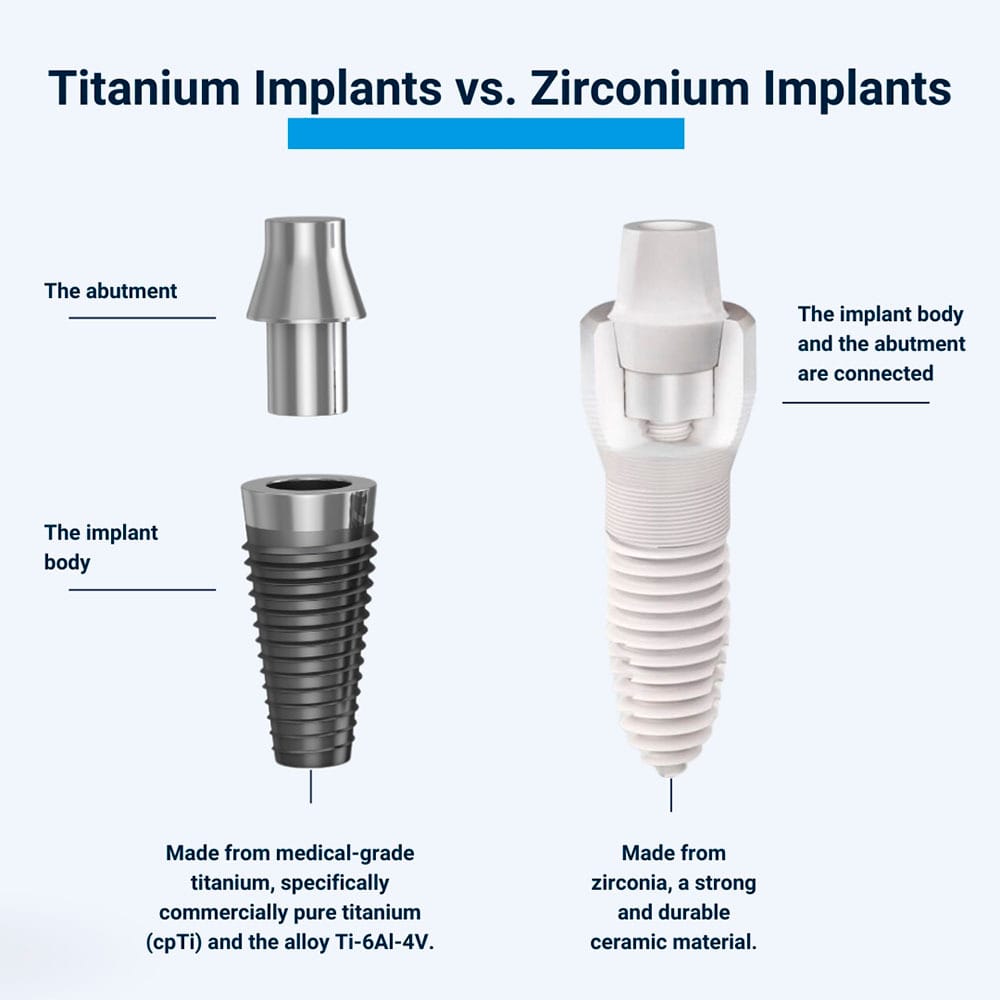
Who Can Get Implant Restorations?
Dental implant treatment is suitable for most people, but a full consultation with our dental implantologist is essential.
If you’re looking for affordable or cheap dental implants in Franklin Square, you’re in the right place. Our experienced dentists — Dr. Michael Kelley, Dr. Ramin Rayhan, and Dr. Richard Nejat—are experts in planning and placing tooth implants, so no matter who you see, you’re in good hands.
We assess every person considering dental implants carefully, and some of the factors we consider include:
Overall Health
Your medical history is important, so we will want to review any medications you use or discuss any existing conditions. These could affect dental implant treatment. You need good general health so you can heal properly after oral surgery.
Conditions that could affect treatment include uncontrolled diabetes. If you have well-controlled diabetes, then you are likely a candidate for dental implants. Smoking is an issue that can negatively impact dental implant treatment as it makes it harder to heal.
Dental Health
We need to ensure that you do not have any dental issues that could affect treatment, like untreated gum disease, tooth decay, or other infections. Any dental problems must be treated first before you can have implant treatment.
Jawbone Health
Your jawbone health is especially important when planning dental implants. We use a cone beam CT scan to evaluate the quantity and quality of bone available. If the bone isn’t sufficient, bone grafting is often an option to rebuild it. However, in some cases – particularly in the upper jaw, where the bone is naturally thinner and less dense – traditional implants may still not be ideal. In these situations, zygomatic dental implants can provide an effective alternative.
Oral Hygiene
You need to commit to following a good oral hygiene routine for teeth implants to be a long-term success. If you fail to look after them properly, your jawbone and gum around the tooth implants may become infected, and there is a risk that your treatment will fail.
We have a great hygiene team here at Clock Tower Dental, so we can work with you to ensure you know how to look after your mouth after implant treatment. Looking after dental implants isn’t tricky, but it must be part of your daily routine.
Age
Generally, you wouldn’t be eligible for dental implants before age 18 because your jawbone is still developing. Being older isn’t a problem; we are much more concerned about your overall health. Tooth implant treatment has helped many older people successfully navigate tooth loss. In fact, we specialize in offering dental implants for seniors, ensuring safe, comfortable, and lasting solutions for older adults.
What Our Patients Say
Rosanne’s Life-Changing Experience With Dental Implants
Understanding the Dental Implants Procedure
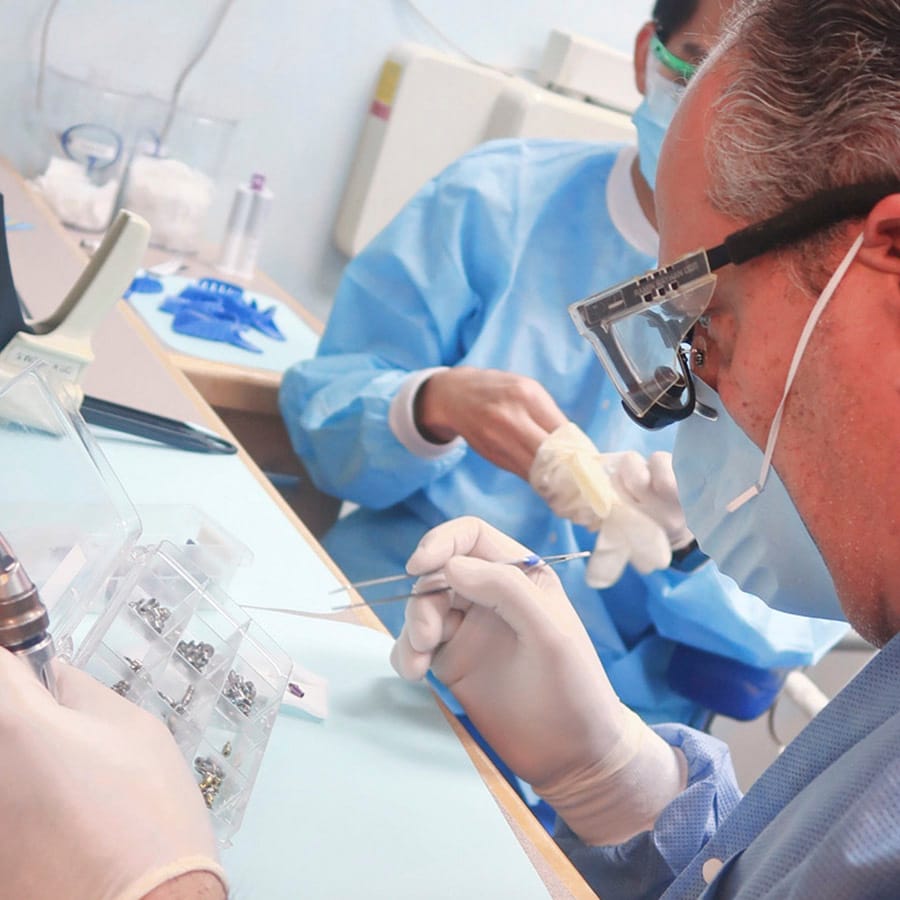 Every implant procedure is different because your oral health is unique. However, there are several steps involved, which are described below.
Every implant procedure is different because your oral health is unique. However, there are several steps involved, which are described below.
-
Initial Consultation
Your initial consultation allows us to assess your oral and medical health and discuss whether tooth implants will suit your needs. It’s your opportunity to ask questions and discover more about this treatment.
-
Diagnostics
We plan and place dental implants using computer-guided implant surgery. Computer-guided surgery is essential because it ensures your treatment is quicker, smoother, much more comfortable, and far more accurate. Afterward, healing is faster, with fewer side effects and less discomfort.
This technique requires detailed diagnostics, including digital dental X-rays and a cone beam CT scan. We may also wish to take digital photos and dental impressions of your mouth.
-
Treatment Planning
Treatment planning takes place behind the scenes, so once we have your diagnostic information, we can assess where to insert each tooth implant. Our dental implant dentists can manipulate the digital diagnostic information so that we can ensure every implant is inserted at the correct angle and depth. We also ensure that your implant teeth function properly and look good once restored.
When your treatment plan is complete, a surgical stent is computer-generated. We use this surgical stent during your implant surgery.
-
Implant Surgery
We ensure you feel as comfortable as possible during dental implant surgery, using a local anesthetic to numb your gums. We can also provide sedation dentistry to help you relax. It can be extremely useful if you require longer or more complex implant treatment.
Once you are ready, the surgical stent is placed over your gums and guides our dentist during your treatment. It ensures only minimal incisions are needed into your gums for the implants to be placed precisely. After fitting your implants, we can provide a temporary restoration while your implants heal.
-
Healing
After your surgery, we will provide clear instructions on how to care for your mouth, and we are always available if you have any questions or concerns.
During healing, a process called Osseointegration must occur, which can take several months to complete. During Osseointegration, your jawbone forms new bone cells around the implant posts, anchoring them firmly in place so they are strong enough to support your new implant teeth.
-
Making Your New Implant Teeth
When Osseointegration is complete, you return to our dental office so we can take new digital dental impressions of your teeth implants. These are used to create new implant teeth, replacing temporary restorations. It may take two weeks or longer to make your new implant teeth.
-
Fitting Your New Implant Teeth
The final stage is to fit your new implant teeth in place and to ensure you know exactly how to care for them so they remain strong and free from infection.
Best Implant Dentists in Franklin Square
Our experienced implant dentists provide top-quality care to restore missing teeth with natural-looking, long-lasting results. We use state-of-the-art techniques to improve your oral health, function, and smile aesthetics—giving you the confidence you deserve.


Learn more: How You Can Choose the Right Dental Implant Specialist
What Are the Benefits of Implant Treatment?
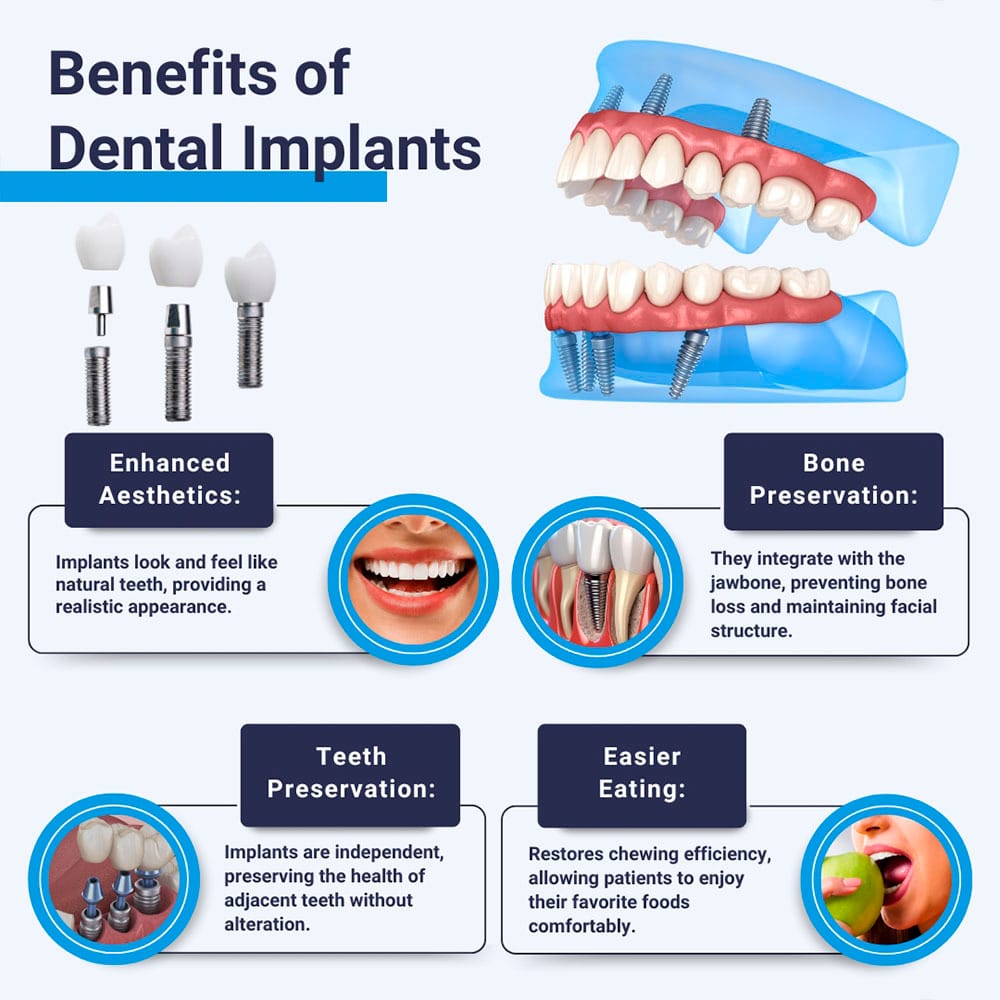
Our dental implants center in Franklin Square offers some of the best cheap dental implants near you, combining affordability with quality care and lasting results, providing significant benefits, including:
A Long-Lasting Solution
Dental implants are durable and should last for years, provided you care for them properly. They can be a great investment in your long-term oral health.
As a rule, the success rate of dental implantation reaches 95%, and when finding highly qualified implant dentists, this figure can reach up to 98%. These high results are because the specialists carefully assess each patient’s condition before treatment to ensure that implantation is a suitable and effective solution.
Excellent Functionality
Teeth implants restore your ability to bite and chew food properly. Fixed implant restorations like crowns and bridges will give you a biting strength similar to real teeth. Implant dentures provide a much greater biting strength compared with an ordinary denture.
Natural Looking Teeth
We custom design every dental implant restoration, ensuring it supports your cheeks and lips correctly and looks and feels natural. We use advanced materials that closely replicate the appearance of real teeth, including the very latest ceramics.
Protecting Your Jawbone
After you lose teeth, your jawbone quickly resorbs without the stimulation of real tooth roots. Dental implants are the only treatment that restores this stimulation, preventing bone resorption around them.
Preventing jawbone loss is important because when it occurs, it can change your facial appearance and destabilize any remaining natural teeth.
Is Implant Treatment Safe?
Dental implants have been widely used for decades and extensively studied for safety and longevity. However, there is always a small risk with any oral surgery, but we take every precaution to minimize dental implant risks.
All dental procedures are performed in accordance with strict infection control standards, and we use only the best implants made from high-quality materials.
Risks can include:
- Dental implant failure. Implant failure is rare, but it can occur if your dental implants fail to integrate with your jawbone or if they are loaded improperly too soon after placement. Another potential risk is teeth grinding and clenching, so if you have this issue, we must treat it first.
- Nerve damage. Improperly placed implants can cause nerve damage that may be temporary or permanent. Computer-guided surgery ensures that our implants are placed precisely, avoiding all nerves and other important structures.
- Implant infection. Dental implants can become infected soon after surgery or years later. Ensuring you look after your implants properly and have regular dental checkups and hygiene appointments minimizes this risk.
Find out more: Franklin Square’s Expert Advice on Dental Implant Complications and Risks
Is Implant Treatment Painful?
With our painless dental implants, you shouldn’t feel any pain during implant surgery, but as the anesthetic wears off, you may have some minor discomfort. Usually, it is controllable with over-the-counter pain relief, or we can provide a prescription.
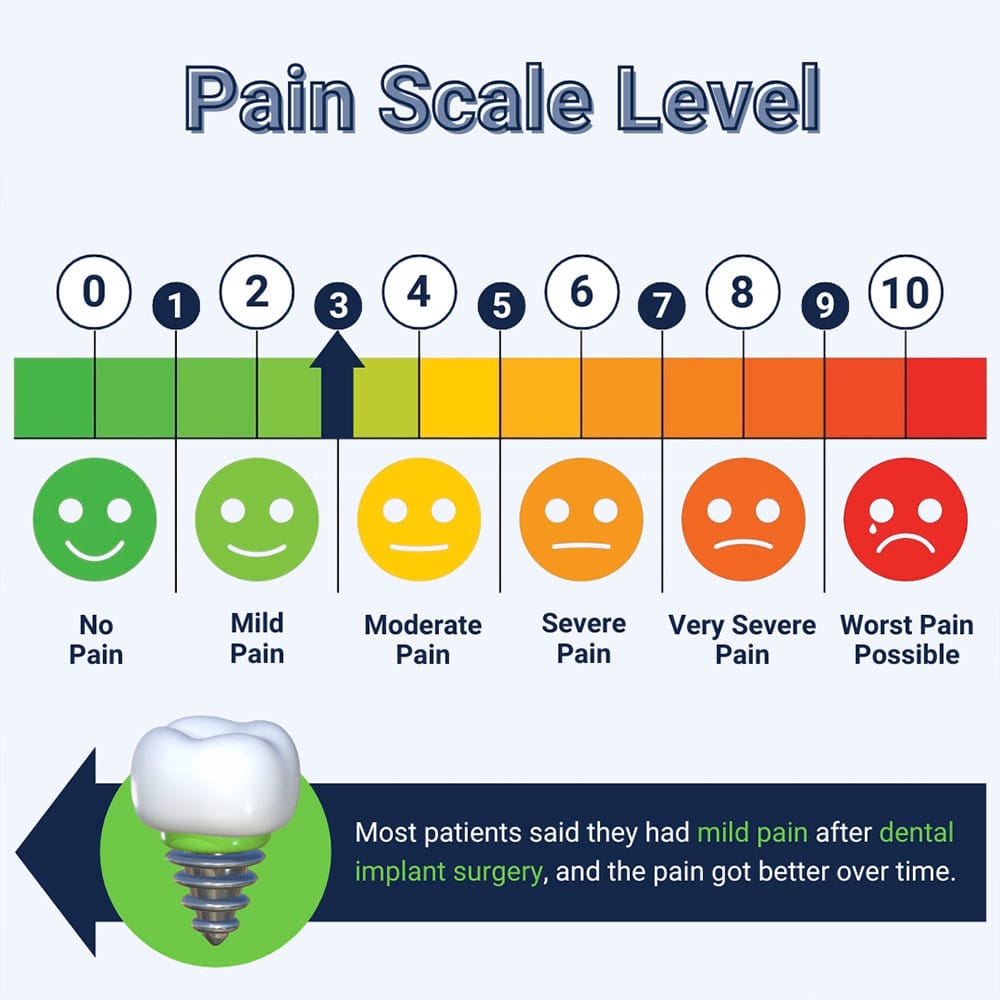
If you only need a single dental implant, having minimal or no discomfort afterward is not unusual.
How Much Do Dental Implants Cost?
After your initial consultation, we can provide you with a clear and easy-to-understand estimate. Your dental implant cost depends on the number of teeth needed, the type of restoration, and whether you require any other treatments like bone grafting.
Some very affordable dental implant solutions are available, especially for entire arches of teeth, like implant dentures.
The cost of dental implants in Franklin Square varies based on individual needs, typically falling between $3,000 and $6,000 per implant. Whether you need one tooth replaced or a full set, there are flexible and affordable options available, including implant-supported bridges and dentures.
Does Dental Insurance Cover Implants?
If you have a good dental insurance plan, it may cover portions of your treatment. However, some insurance companies still classify cosmetic dental implants as an elective procedure and may offer limited or no coverage. We recommend contacting your insurance provider for details or asking our team for assistance and guidance.
The Bottom Line
Teeth implants are a reliable, long-lasting solution for replacing missing teeth, offering superior function, aesthetics, and bone health preservation. At Clock Tower Dental in Franklin Square, our experienced implant dentists deliver personalized, state-of-the-art care—whether you need a single tooth restored or a full-arch solution. With high success rates, affordable treatment options, and a strong focus on patient safety and comfort, we make implant dentistry accessible and effective for everyone. Schedule your consultation today and take the first step toward a healthier, more confident smile.
FAQ
How Long Do Dental Implants Last?
With the proper care, dental implants can last for 20 years or longer, making them a long-term solution. They often endure for a lifetime, which can be prolonged by refraining from smoking, getting regular dental exams, and practicing good oral hygiene.
Do Dental Implants Hurt?
Most patients report only minor discomfort during and after the dental implant procedure. During surgery, the area is numbed, and over-the-counter painkillers can typically be used to manage any post-operative soreness. Discomfort usually goes away in a few days, and recovery is usually uneventful.
Who Is a Good Candidate for Dental Implants?
Dental implants may be a great option if you’re missing one or more teeth and have healthy gums and adequate jawbone density to support the implant. According to WebMD, ideal candidates are in good overall health, don’t smoke, and are committed to maintaining excellent oral hygiene. During your consultation at Clocktower Dental, our experienced implant specialists will evaluate your oral health and use advanced imaging to determine if implants are the right solution for you.
What Are the 3 Types of Dental Implants?
The three main types of dental implants are:
- Endosteal Implants – the most common type, placed directly into the jawbone.
- Subperiosteal Implants – placed under the gum but above the jawbone, used when bone height is insufficient.
- Zygomatic Implants – a less common option anchored in the cheekbone, ideal for patients with severe bone loss in the upper jaw.
Are Dental Implants Safe?
Yes, dental implants are a safe and well-established solution for replacing missing teeth. They are composed of materials that the body can accept, such as titanium, and have a high success rate. Implants are a dependable, low-risk, long-term solution when done by qualified specialists.
Schedule Your Dental Implants Consultation Today!
If you’re in need of the best dental implants in Long Island, the Clock Tower Dental team is here to help. Whether you live in Franklin Square, nearby communities, or just a few miles away in Garden City, West Hempstead, Elmont, Valley Stream, Malverne, Floral Park, or New Hyde Park, we invite you to schedule a personalized consultation. We offer a full range of services to restore your smile, improve function, and support long-term oral health—right here in Franklin Square.


